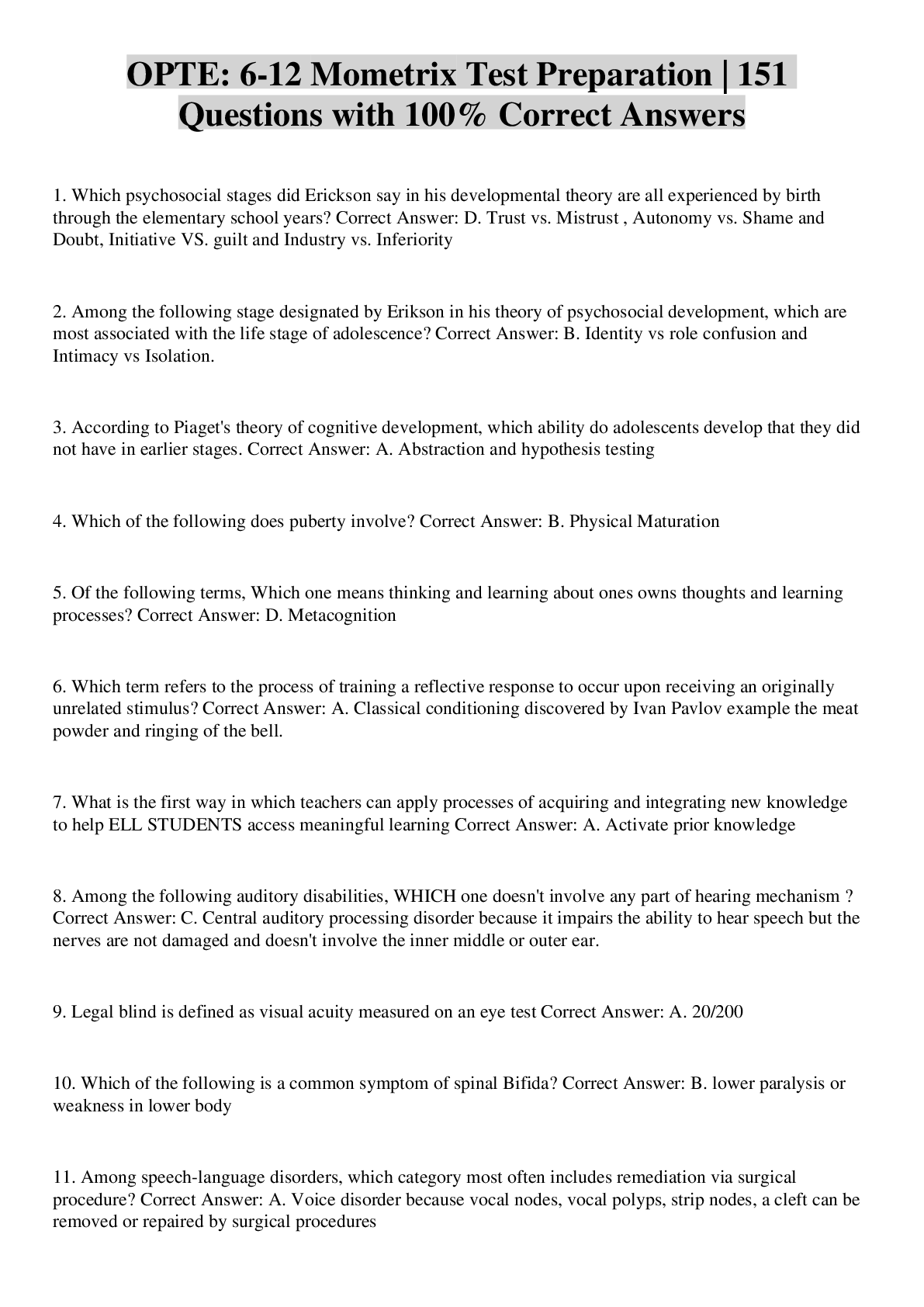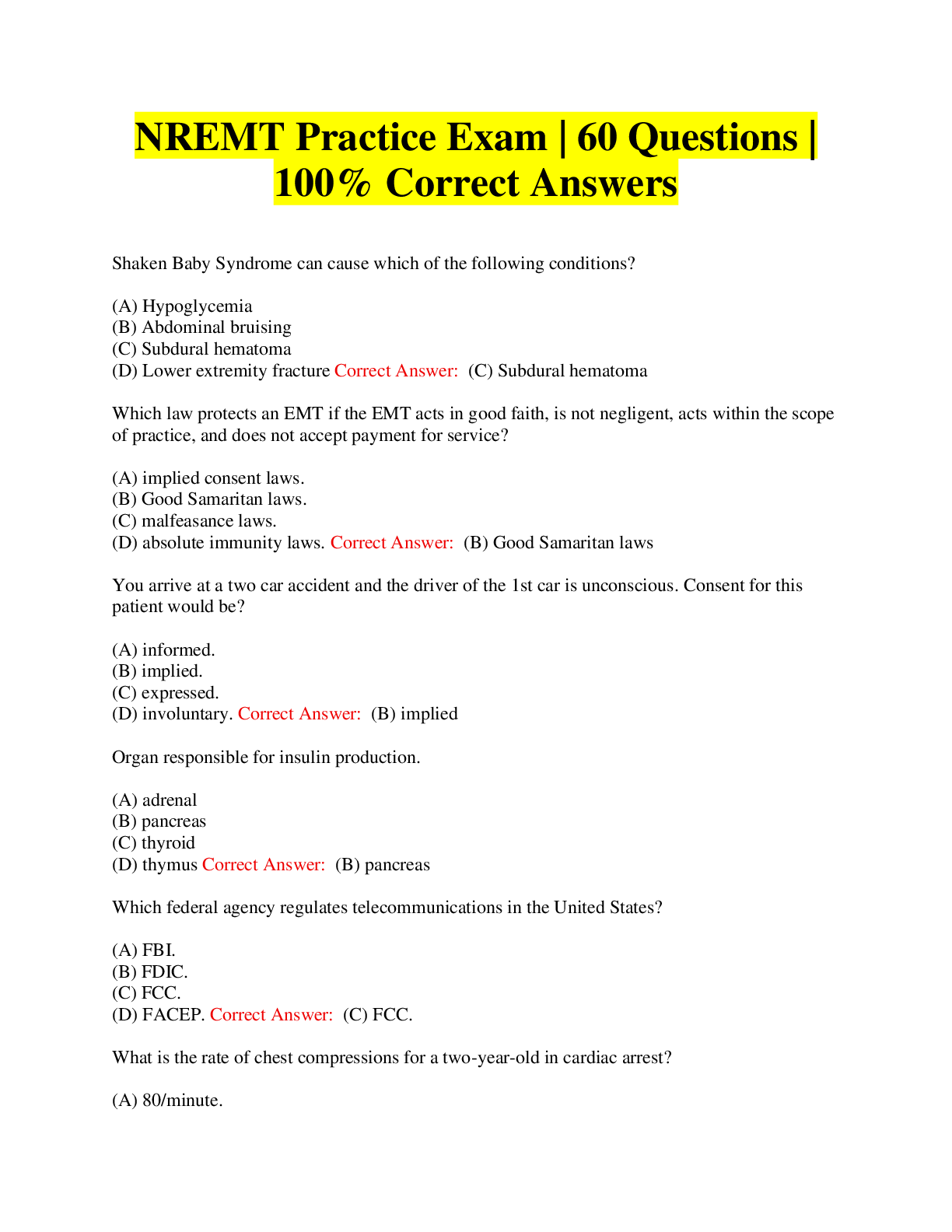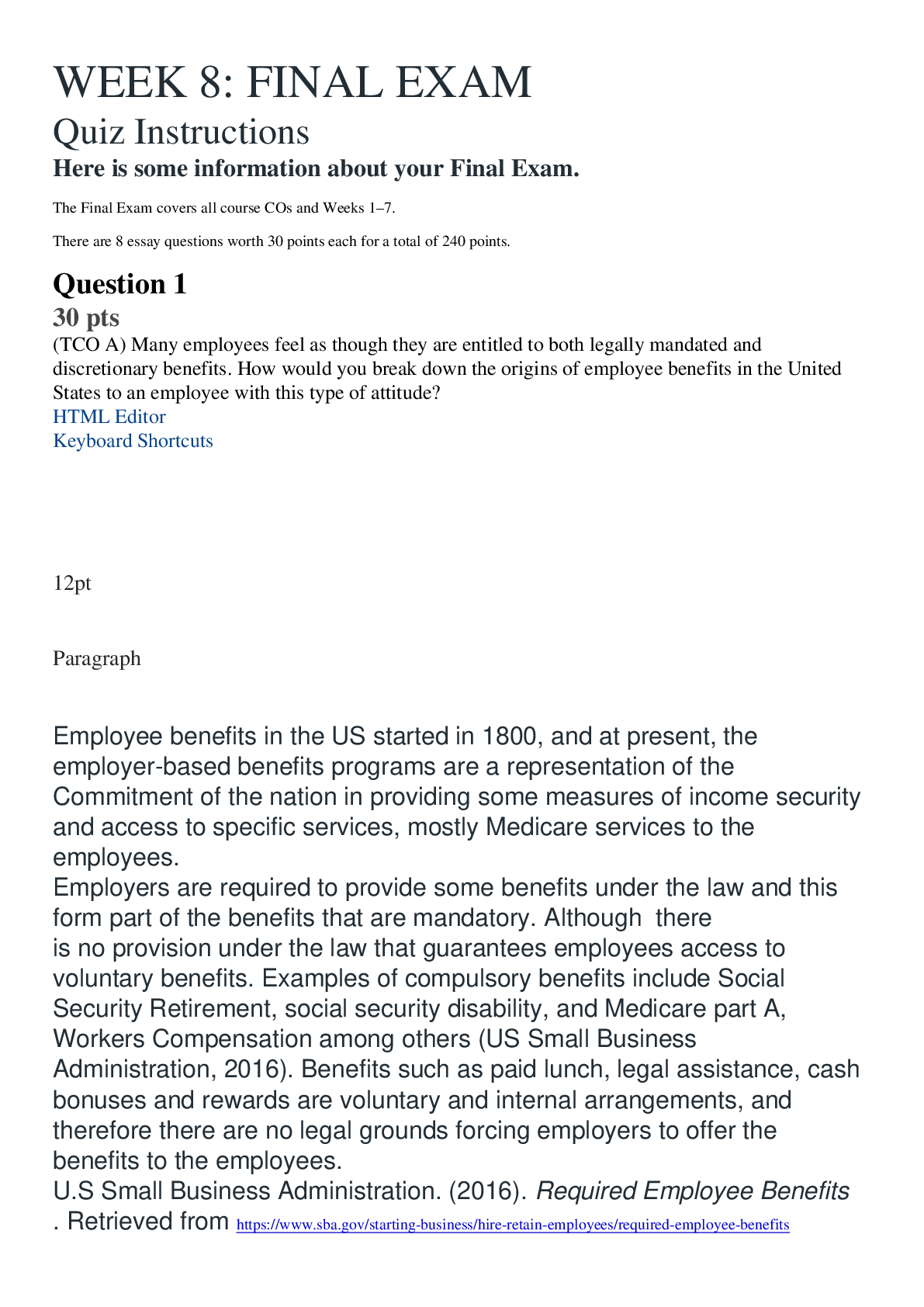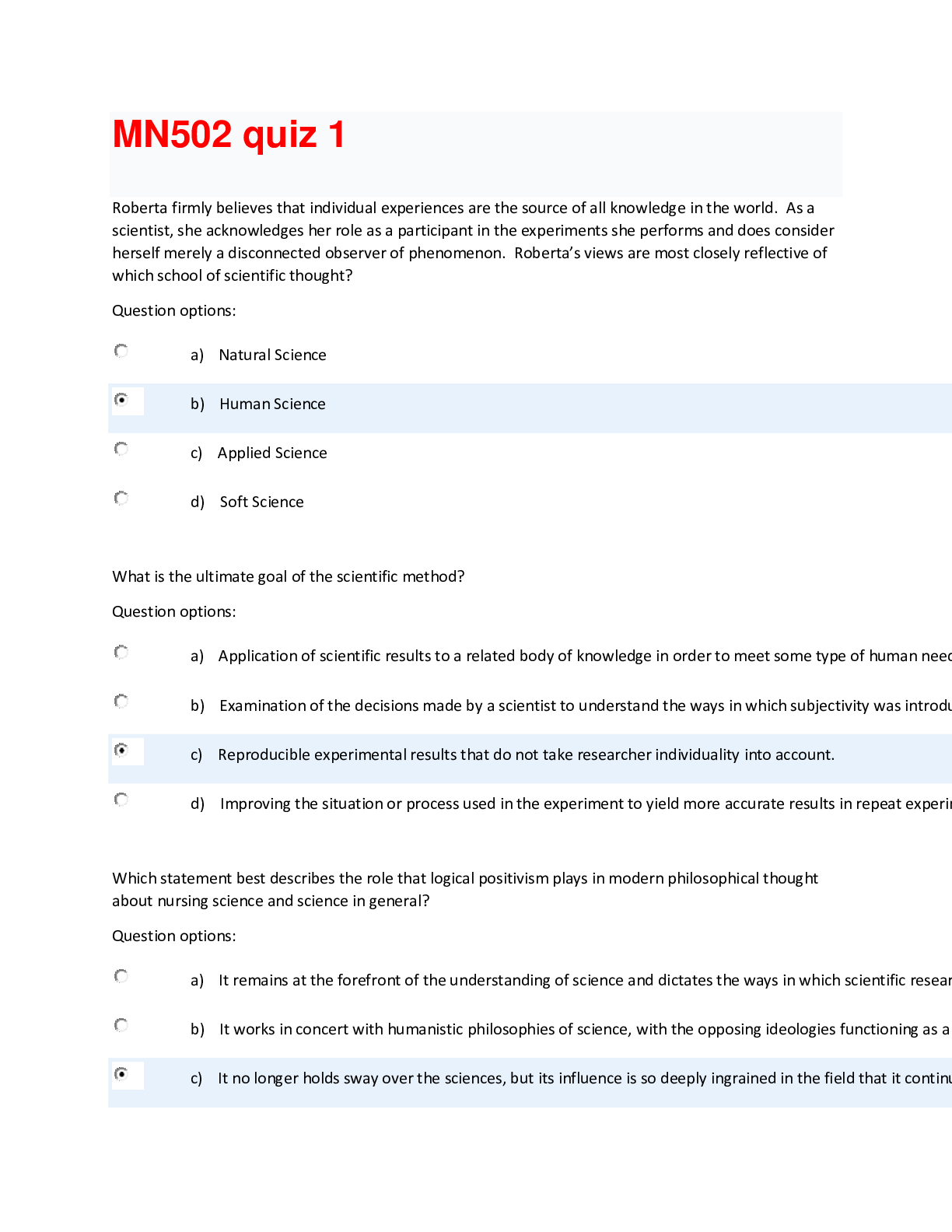Health Care > EXAM > LMSW EXAM - Boot camp, LMSW, LMSW QUESTIONS AND ANSWERS 100% CORRECT (All)
LMSW EXAM - Boot camp, LMSW, LMSW QUESTIONS AND ANSWERS 100% CORRECT
Document Content and Description Below
LMSW EXAM - Boot camp, LMSW, LMSW 3 Areas to identify in each question (PPL) Ans- 1. Problem 2. Person 3. Last Sentence (guide to answer question) Key words Ans- 1. Person/Client "hot sea... t" 2. SAFETY Red Flags - suicide, abuse, life-threatening, unexplained marks, alcohol, recent loss 3. Strong words/adjectives 4. Age 5. Diagnosis 6. Symptoms/Duration 7. Who are you? 8. Where are you in session? 9. Quotations 10. Direct requests/concerns 11. Qualifiers (First/Next/Best) Distractors Ans- FARM GRITS ROAD - Answers that look appealing at first glance but are often wrong - ELIMINATE! Exam is here and now DO NOT CHOOSE FARM GRITS ROAD Ans- 1. FOCUS on unresolved issues/past 2. ADVICE - giving/judging 3. RECOMMEND "to a support group" 4. MAKE an appt. 5. GIVE pamphlets/literature 6. RECOMMEND a session 7. INFORM parents/speak to parents (when child/ado) 8. TERMINATE (Exceptions: Moving, client reaches goals/no new crisis, client does not pay) 9. SPEAK to supervisor (except transference/counter) 10. RESPECT self-determination (If mentally UNSTABLE) 11. OFFER contract as a reminder 12. ALLOW the clients to lead the session 13. DO nothing/say nothing How do you answer first/next questions? Ans- 90% of exam is SAFETY FIRST. How does the exam want you to have a CLEAR understanding of client's issues? Ans- ASSESS BEFORE ACTION. RUSAFE Ans- 1. RULE out medical 2. UNDER the influence/delusional/hallucinating Do Not Treat 3. SAVE Lives - Safety first (Answers: Duty to warn, report child/elder abuse, 911, mobile crisis, ER) 4. ASSESS before action - (Answers: ASSESS, ASK or DICE - Determine, Identify,Clarify, Explore) 5. FEELINGS - (Answers: ACKNOWLEDGE person's feelings) CONCERNS (AID ASSIST, INFORM client, DISCUSS concerns) 6. EMPOWER - If client is mentally stable/alert (Answers: Respect client's decisions) COE: Ethical responsibilities towards clients Ans- 1. Client's best interests are primary 2. Respect/promote right to self-determination if client is mentally alert/stable, NOT unstable/intoxicated/psychotic 3. Informed consent, written agreement by client to undergo treatment, risks/benefits/costs disclosed 4. Avoid conflicts of interest (Things that interfere with SW's impartial judgment/discretion) 5. DO NOT promote individual therapy sessions to ppl who have a relationship w/ each other (except couples, family, group treatment) - Provide family members with appropriate referrals 6. Avoid dual/multiple relationships 7. Avoid bartering (unless common practice in community) 8. Obtain a professional translator FIRST if client does not speak the language of SW 9. Do not disclose client information w/out consent unless req'd by law 10. Provide client with reasonable access to records (First explore/discuss reason for request) Follow laws of state. 11. Ensure CONTINUITY of services 12. NO relations with clients past or present Mandated reporting Ans- SW's are req'd and responsible for reporting any instances of abuse that is suspected. Abuse includes physical, emotional, sexual, neglect, CHILD AND ELDER ABUSE Duty to Warn Ans- SW's MUST WARN a threatened victim of any harm that his/her client may cause when there is a REAL INTENT (PLAN) HIV Decisions Ans- NOT DUTY TO WARN! 3 options: 1. FIRST urge client to disclose to partner 2. FIRST encourage client to engage in safe sex 3. Research/follow state laws as needed Subpoena by the court Ans- SW may be req'd by law to disclose confidential information COE: Ethical responsibilities to colleagues Ans- 1. Refer to colleague who may be better trained in an area than SW. SW can take client but must be COMPETENT. 2. When CONSULTING with colleague, disclose least amount of information 3. FIRST speak to a colleague to discourage/prevent/correct unethical behavior 4. AVOID relationships with colleagues (conflict of interest) COE: Ethical responsibilities in practice settings Ans- 1. Accurately document services in client's records while keeping best interests in mind 2. Maintain records securely for a period of time consistent with state laws COE: Ethical responsibilities as professionals Ans- 1. MONITOR/EVALUATE policies and implementation of programs 2. ADVOCATE when necessary HMO Insurance/Short term Care/MANAGED CARE Ans- 1. Emphasizes short term, discourages long term treatment 2. Cases assigned to case manager to whom provider must justify necessity for treatment for payment and services. 3. More precise diagnosis = greater likelihood of reimbursement 4. Encourages Cognitive/Behavioral short term TX. 5. Contracts are INFLEXIBLE, abide by rules to receive reimbursement Disorders in Infancy, Childhood, Adolescence Ans- Autism, ADHD, Oppositional Defiant Disorder, Conduct Disorder, Enuresis, Separation Anxiety Disorder Adult Disorders Ans- Delirium, Dementia, Amnestic/Cognitive Disorders, Schizophrenia and other Psychotic Disorders, Mood Disorders, Anxiety Disorders, Somatoform Disorders, Factitious Disorders Autistic Disorder Ans- 1. Deficits in social interaction and nonverbal COMMUNICATION 2. Lack of peer relationships. eye contact, abnormal body movement, 3. Restricted, repetitive patterns of behavior 4. Inflexibility to routine, Fixed interests Attention Deficit Hyperactivity Disorder Ans- 1. Symptoms at least 6 months 2. Inattentive: Difficulty focusing, staying on task follow-through, listening, easily distracted, loses things, forgetful 3. Hyperactive: Impulsive, fidgeting, running around, talking excessively 4. Several symptoms present prior to age 12 5. Must occur in 2 or more settings 6.. Behaviors can increase/decrease based on settings. 7. TX: Behavior modification Oppositional Defiant Disorder Ans- At least 6 months - Angry, irritiable, defiant, talking back to adults, rebellious behavior, attitude, blames others, cursing, lying - NO SERIOUS VIOLATIONS OF OTHERS RIGHTS Conduct Disorder Ans- 1. Violates other's rights, bullies, shoplifts, truancy, DX up to age 17 2. TX: Family, schools, community, client, parent/child behavior modificationq skills Enuresis Ans- 1. Repeatedly urinating during day/night 2. Up to 5 years old 3. Rule out medical first Separation Anxiety Disorder Ans- 1. Excessive distress when separated from major attachment figures. 2. Clinging, school refusal, sleep refusal 3. School Phobia is a form of separation anxiety. 4. Brought on when leaving home/family members to attend school. 5. At least 1 month of symptoms Impulse control disorders Ans- Trichotillomania, Intermittent Explosive Disorder, Gambling, Kleptomania, Pyromania, Delirium Ans- 1. Disoriented 2. Short period of time 3. Sometimes due to medical condition/substance use: DEHYDRATION, HEAD TRAUMA Dementia Ans- 1. Slow onset 2. Deterioration of memory/cognition 3. Alzheimer's, HIV, Parkinson's Amnestic Disorders Ans- Memory impairment w/out cognitive impairment Korsakoff's Syndrome Ans- Chronic alcoholism causes inability to recall previously learned information Schizophrenia Ans- 1. Hallucinations, delusions, disorganized speech, disordered/catatonic behavior, impaired thinking, negative symptoms (diminished emotional expression or avolition) THOUGHT DISORDER 2. Duration at least 1 month, but more than 6 months 3. TX = Medication and ego-supportive therapy (No INSIGHT therapy!) Schizophreniform Ans- 1. Same symptoms of schizophrenia 2. DURATION is at least 1 month, but less than six months 2. Triggered by turmoil/high stress 3. TX = Mediation and supportive therapy Delusional Disorder Ans- 1. NON-BIZARRE/IRRATIONAL beliefs/delusions 2. Hallucinations absent or not prominent 3. Persecutory/Jealous Types of delusions 4. NO IMPAIRED FUNCTIONING Brief Psychotic Disorder Ans- 1. 1 Symptoms of criterion A Schizophrenia 2. DURATION LESS THAN 1 MONTH Psychotic symptoms may also occur during which other conditions? Ans- Bipolar 1 Disorder, Major Depression, Substance Induced Mental Disorders, Mental disorders due to a medical condition (ex. Amphetamine induced psychotic disorder with delusional features), Delusional Disorder, Borderline [Show More]
Last updated: 2 years ago
Preview 1 out of 34 pages
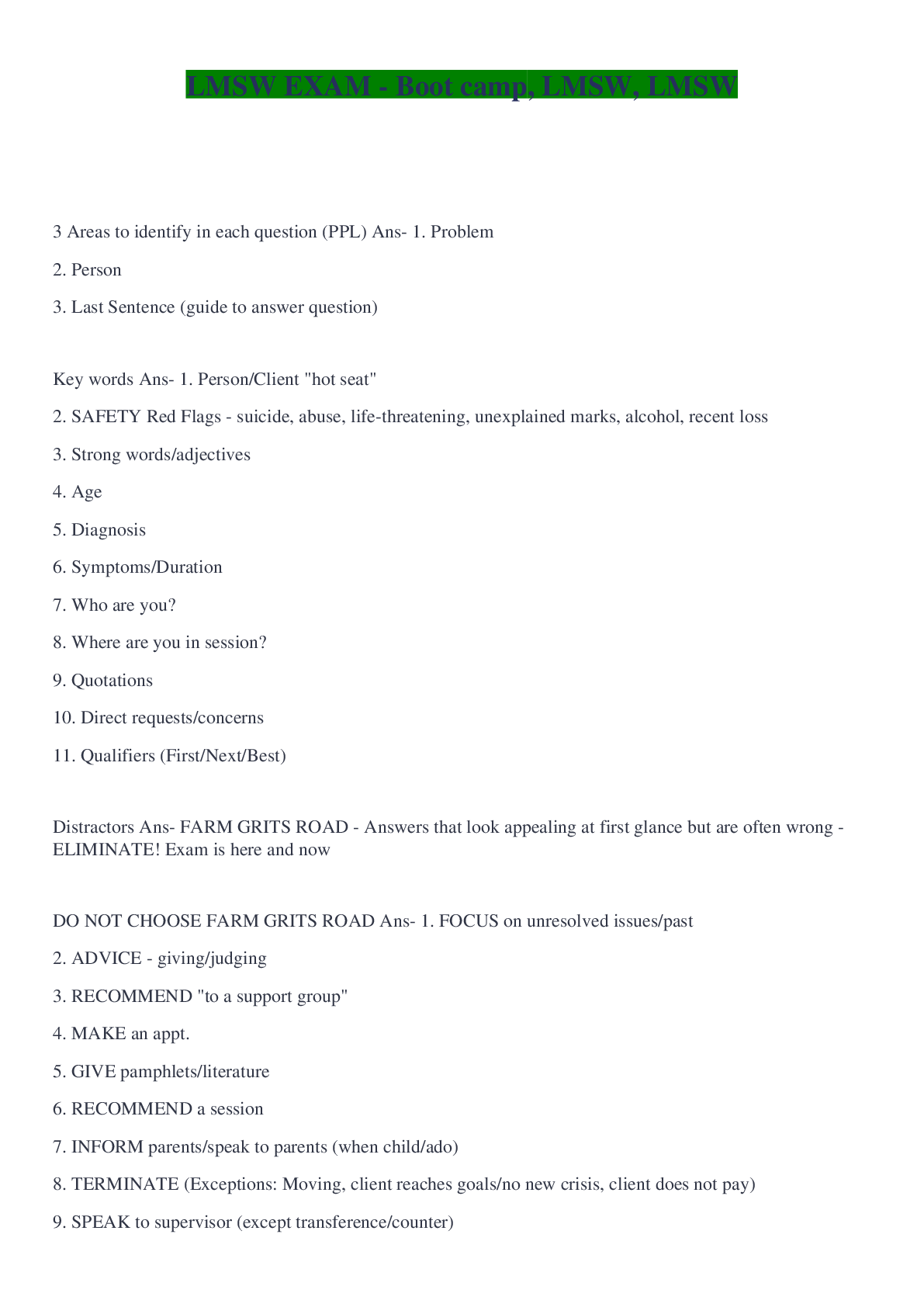
Buy this document to get the full access instantly
Instant Download Access after purchase
Buy NowInstant download
We Accept:

Reviews( 0 )
$15.00
Can't find what you want? Try our AI powered Search
Document information
Connected school, study & course
About the document
Uploaded On
Sep 15, 2022
Number of pages
34
Written in
Additional information
This document has been written for:
Uploaded
Sep 15, 2022
Downloads
0
Views
80

